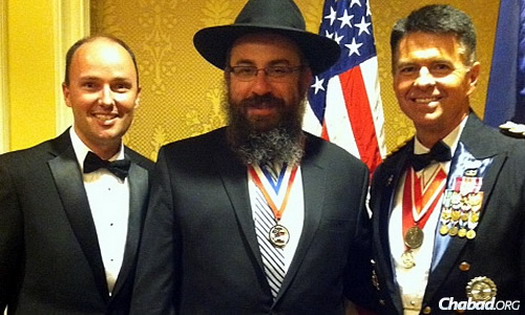
Utah Rabbi Awarded for Work With At-Risk Kids
Rabbi Benny Zippel opened his email a few months ago to find that he had been selected to receive an award from the Utah National Guard. So on June 11, he and his wife, Sharonne—co-directors of Chabad Lubavitch of Utah—joined seven other honorees and supporters at a black-tie event at the Little America Hotel in Salt Lake City. There, they were recognized as part of the 53rd Annual Bronze Minuteman Awards.
Lt. Gov. of Utah Spencer J. Cox spoke about the award’s significance and how it is given each year to individuals who go out of their way to give back to the community. Then Cox—along with Maj. Gen. Jefferson S. Burton, the Adjutant General of Utah, and Brig. Gen. (Ret.) E.J. “Jake” Garn, former U.S. senator of Utah—presented Zippel with the award.
Zippel, founder of Project H.E.A.R.T (Hebrew Education for At-Risk Teens), met a lot of people that night. They wanted to know about his work with teenagers at residential treatment centers in Utah. The rabbi, who explains that he focuses on the emotional, psychological and spiritual stability of those he assists, says “people were very appreciative and very grateful.”
He was awarded a certificate and a statue of a minuteman holding a rifle, with a plaque at the bottom.
As far as those at the dinner attested, this was the first time a Jewish person in Utah was given the award—much less a rabbi. “I actually felt very humbled by being there,” says Zippel, adding he believed that his presence contributed to the broader community, while at the same time served to pay respect to the Rebbe, Rabbi Menachem M. Schneerson, of righteous memory.
Zippel’s entire approach is based on the Rebbe’s work and teachings, he says, and resonates with a similar theme. “I shared with people about what the Rebbe saw in every person—the Divine spark found within them. He gave each individual—no matter what background or affiliation—the chance to tap into that Divine spark, and use it as a catalyst for individual self-improvement and self-actualization.”
Another captivating topic of conversation wound up being the Zippels’ dinner; they had been provided with pre-packaged kosher meals.
“People thought it was amazing—they thought it was the greatest thing ever,” remarks Zippel, who says he used the opportunity to talk with other attendees about the laws of keeping kosher. “They were just staring at my plastic container, at my plastic cutlery and plastic cup and bottle of water, and they were in awe that in the middle of Utah, there’s someone who remains so committed to our religious obligation.”
Meanwhile, the event also gave him the chance and the platform to raise awareness about Project H.E.A.R.T., which he founded in 1992.
“I want people to know that Project H.E.A.R.T. exists, and I want people to know that help is available,” he stresses. “And I want them to know that it is my goal to transform every at-risk teen into the gem that he or she truly is.”












